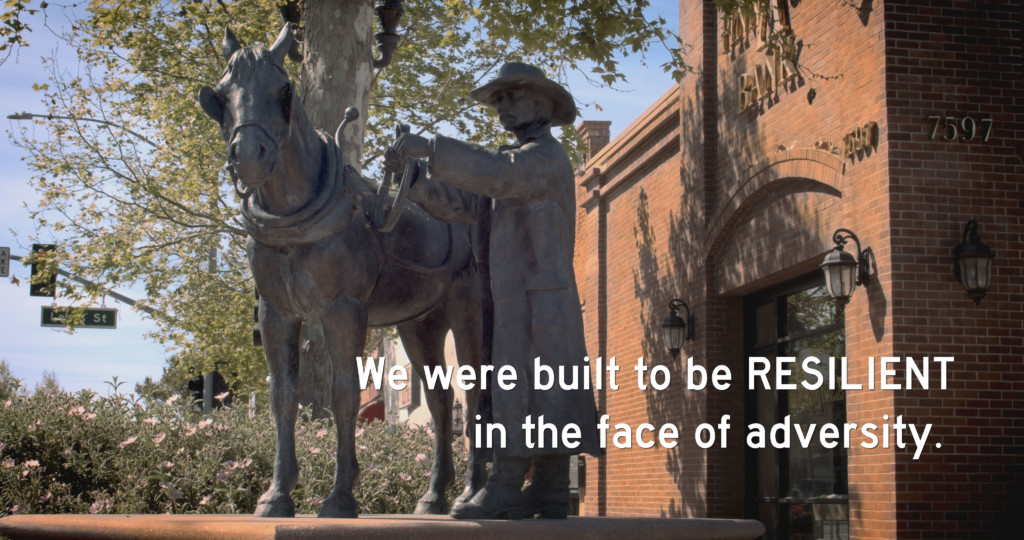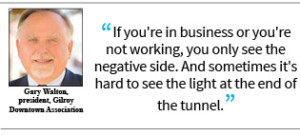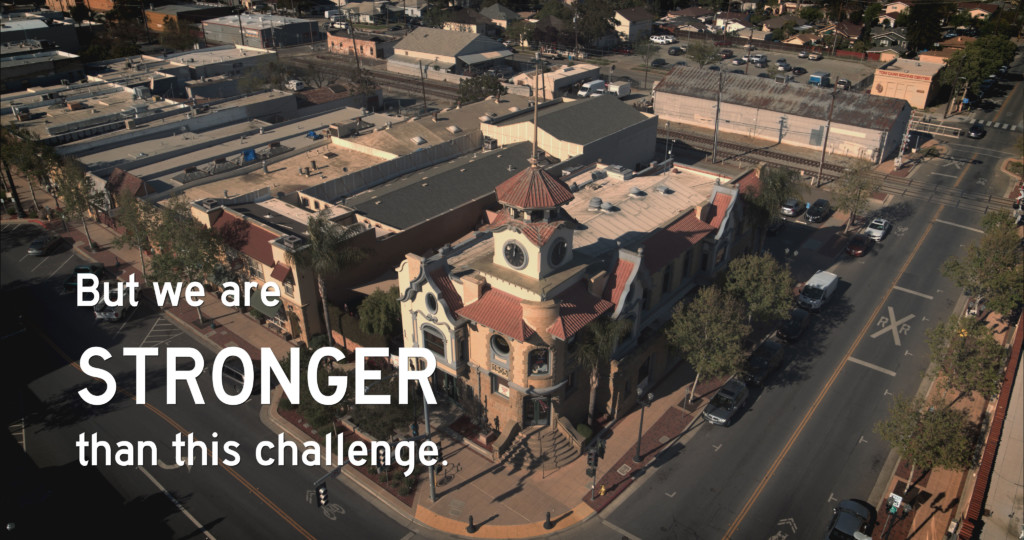Nonprofit profile: GDBA is working to keep businesses open
Video evokes a positive message to raise hope during pandemic

Screen shot from online video created by 152 West Productions to encourage Gilroy residents during pandemic.
By Marty Cheek
With the financial hit on local merchants and restaurants from the COVID-19 crisis, the Gilroy Downtown Business Association introduced the first of a series of online videos to encourage people to stay positive and remind residents that, by helping one another, the community will survive this challenging time.
The first video was produced by 152 West Productions team of Mattie Scariot and Nils Myers. It starts with a drone fly-over of the downtown showing empty streets and the words “This spring things are different.” More shots show a Monterey Street empty of traffic and pedestrians. As the video continues, it provides reminders of Gilroy’s past with scenes of people mourning after the Garlic Festival shooting and images of the statues of pioneers located throughout the downtown. Uplifting music and messages on the screen promise hope for the future.
 “We saw an opportunity as an organization to financially aid our independent businesses downtown as well as businesses throughout the city,” said Gilroy Downtown Business Association President Gary Walton. “The video was a follow-up to our Gilroy Faves Gift Card Program that was recently launched. We were inspired by the response to our gift card program and wanted to encourage the community to stay strong and continue to support our local businesses, neighbors, and first responders.”
“We saw an opportunity as an organization to financially aid our independent businesses downtown as well as businesses throughout the city,” said Gilroy Downtown Business Association President Gary Walton. “The video was a follow-up to our Gilroy Faves Gift Card Program that was recently launched. We were inspired by the response to our gift card program and wanted to encourage the community to stay strong and continue to support our local businesses, neighbors, and first responders.”
The association is working with 152 West on the second video. The business sponsors of the video include Maxima Realty Group, Michele Campbell Insurance, Farmers Insurance Maria Cid Agency, and Pinnacle Bank.
With the pandemic, businesses have lost a “significant” amount of revenue as residents follow the county’s stay-in-place orders or have limited income due to job loss, Walton said. The ripple effect hurts independent business owners in the downtown and throughout the rest of Gilroy by between 25 and 50 percent of what they normally do in revenue.
Starting the Gilroy Faves Gift Card Program was an action the GDBA tried to keep independent businesses throughout the city afloat, he said. Participants can go to the website (www.GilroyFavesGiftCards.com) and purchase a card to redeem at local business. The association gives 100 percent of the proceeds to the business. The board recently voted to add 10 percent to the gift card purchase, so a person buying a $100 card gets $110 in purchase power.
Bruce Haller, owner of Café 152 Bread Company in the downtown corridor, sees the cards as helping in sustaining his business.
“For me, my days were numbered, and then the Gilroy Downtown Business Association got involved,” he said. “Sometimes when you are so submerged in trying just to survive your perspective becomes focused on the negative. Their video reminded me that there is a light at the end of the tunnel. Thank you to the GDBA for driving that vision and for all the help.”

Screen shot from online video created by 152 West Productions to encourage Gilroy residents during pandemic.
The production of videos and a project enhancing the association’s website content during the next months will enable locals to remember that, in the challenges of this public health crisis, the community needs to stay focused on the future, Walton said.
“There is just so much negativity. If you’re in business or you’re not working, you only see the negative side,” he said. “And sometimes it’s hard to see the light at the end of the tunnel. The point of the video was look: This is not the first time we’ve had to deal with a disaster . . . It was meant to basically say, ‘Don’t forget. We will get through this and better times are ahead.’ That was the message that we wanted to say.”
Most of the downtown restaurants have resorted to take-out only to serve their customers, he said. None as of May 7 announced they will permanently close but if the economic impact of COVID-19 continues, that will likely happen. Walton cited a report that San Francisco might lose about 50 percent of its eateries. New regulations expected to come out as re-opening begins may require restaurants to use only 25 percent of their dining area. There will also be other rules and regulations for public health while dining.
“Long term, that’s not sustainable,” he said. “What we read is that businesses have maybe less than 30 days cash. Restaurants have probably less, maybe 16 days of cash available.”
To help businesses, the association offered a proposal to the city that included providing financial assistance with small business loans to sustain them during the economic devastation of the coronavirus. But the city faces its own financial hit on the general fund budget as sales tax and hotel tax revenue drops significantly, especially with the Gilroy Premium Outlets stores closed and fewer people traveling.
“There are going to be a couple of quarters where things are not going to be good and who knows what it’ll be like next year,” Walton said.
The idea of money from the city was to reduce the loss of local businesses and thus make sure that tax revenue streams continue when the economy does bounce back and stores and restaurants will still be open so it won’t take a long time to bring new businesses into downtown buildings.
“The city can’t solve all the problems, but I think it’s important as a community that we come together and do as much as we can, and that includes the city,” Walton said. “People have been paying sales tax revenues for years and years and years and I’d like to see it as a two-way street.”
During and after the COVID-19 crisis, downtown businesses must become more creative in using resources to survive and rebuild. The impact is not only on the economy but also the quality of life of the community as the virus hurts local families, he said.
“This is not going to turn around overnight,” Walton said. “There is a lot of discussion of lives being lost. But there are a lot more people who are losing their livelihoods. There are a lot of implications, even health implications, in terms of people losing everything they’ve worked their life for. Depression, suicide, domestic violence. There’s mental health impacts because of that as well.”
